Four very fine Japanese Christmas movies and a really good one
Peter Breedveld

Last year I recommended five excellent Japanese Christmas movies for those looking for something a little different to feed the Christmas spirit. There are not many Japanese Christmas movies but they do exist and some of them are pretty good, too. So here follow five more recommendations and a hearty Meri Kurisumasu!
5: Christmas on July 24th Avenue (Murakami Shosuke, 2006)
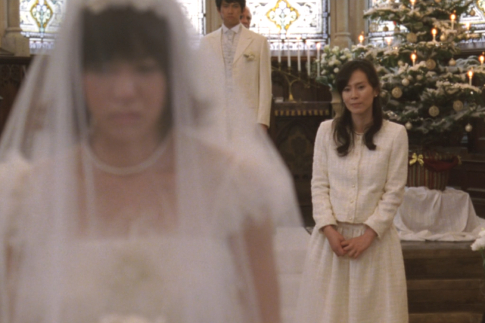
Christmas on July 24th Avenue is a movie like a women’s manga, with goofy characters, silly jokes, and a love interest in the shape of the dullest guy you could possibly imagine but your mother will be very happy with. A nerdy woman who can’t do anything without causing catastrophes idealises Lisbon like Japanese tend to idealise Europe. She’s in love with the ideal man and ignores the advances of a geeky bookstore clerk, tries to change herself into the woman she thinks the object of her desire will like but this, of course, is bound to fail.
She seems to take her frustrations out on her handsome brother’s fiancée who is, strangely slightly incestuously, the spitting image of his sister. What irritates her is that she thinks her brother can do much better and she almost destroys their impending marriage telling her so. In the end, happily, it is settled that she and her future sister in law are fine as they are and everybody lives happily ever after.
This is a very insubstantial romantic comedy but pretty to look at and very entertaining. There are (imaginary) scenes set in Lisbon which is always interesting, seeing Europe through Japanese eyes. All the action takes place in Nagasaki, which I didn’t know was such a gorgeous place.
4: It All Began When I Met You (Motoki Katsuhide, 2013)
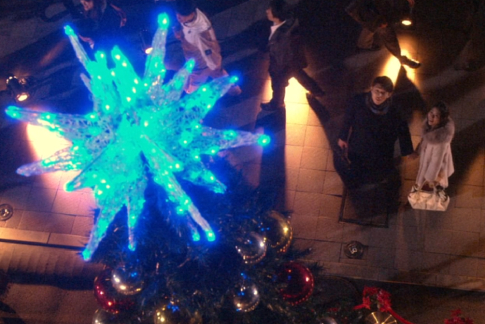
It All Began When I Met You is a Christmas movie with six melodramatic storylines situated around Tokyo Central Station, involving people whose lives are loosely intertwined. There’s a train driver with a loving wife and a dear ten year old son who has terminal cancer, an elderly woman who never married because the love of her life mysteriously stood her up 49 years ago, a woman working at an orphanage where one of the children needs special care, a couple with a long-distance relationship which is under strain and a young couple just beginning to court.
This sounds like a run off the mill romantic Christmas movie and that’s what it is, only I didn’t expect to enjoy it as much as I did. The actors are great, the atmosphere just right, the cinematography well done and the film seems really inspired with a warm-hearted humanity. I really had a good time watching this.
And the great thing is, you can watch it too in its entirety on YouTube, free of charge and with English subtitles. As long as that lasts, of course.
3: Go Find a Psychic! (Motohiro Katsuyuki, 2009)

This comedy about a bunch of psychic guys gathering in a café on Christmas Eve is genuinely funny. The psychics hide their special abilities (moving objects, mind-reading, seeing through things, one guy can set time still for five seconds) for the public because they don’t care for being the research objects for curious scientists.
Alas, a woman arrives who is scouting for a national television programme about psychics. So far the programme has only featured fakers looking for fame and the woman is charged with finding real psychics with real abilities.
It so happens she has an appointment at the very café with a man who claims to have a special power which is no power at all (the ability to move through spaces that any average-sized person can move through. When later in the film he tries to escape through a small window he gets stuck, which I find hilarious).
But because of all kinds of misunderstandings and mishaps the real psychics in the room are on the verge of being found out and a vast range of shenanigans follows to cover up their blunders, only to result in even bigger blunders. Objects are moved, champagne bottles explode, time is stood still, breasts are peaked at, until the woman is convinced there is nothing special about these dorks and leaves disappointed. Then the psychics feel guilty and decide to give her a special Christmas gift I will not spoil for you.
This is a very toned-down comedy with anti-dynamic humour, based on a play, which is obvious, but it’s really, really good and genuinely funny.
2: Blue Christmas (Okamoto Kihachi, 1978)
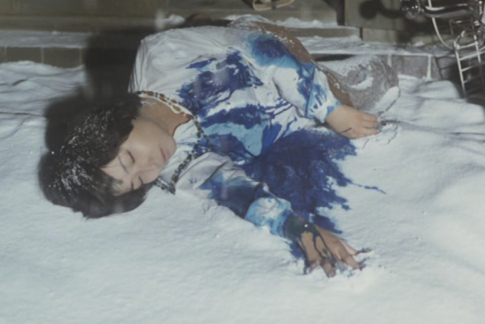
Blue Christmas a very weird movie about a conspiracy by the world’s governments to exterminate people with blue blood on Christmas Eve. Okamoto is the director of the genius movie Sword of Doom, starring Nakadai Tatsuya as a psychopathic samurai descending the path towards his own destruction. In Blue Christmas he is a reporter discovering the conspiracy against the blue-bloods.
But it’s all really strange. For instance, we see Nakudai wandering around New York, asking receptionists, shoppers, homeless people and children directions to some UFO research facility in a totally bizarre, very long scene. There are quite some scenes like this: silly, surreal, bizarre, and they seem to make no sense at all.
However, this is no two-bit director at work here, Okamoto is one of the greatest, so the whole film is well-executed. The filming, the acting, the editing. Somehow this works. Okamoto slowly builds his story, starting with the exposure of the first blue-bloods, the impact on the personal lives of the characters, the revelation of the conspiracy, alternating between drama, thriller and newsreels of protesting masses, giving everything a certain paranoid sense of reality.
Apparently afraid someone might miss the message contained in his film, Okamoto puts in some explicit references to the Holocaust. In one scene, Japanese blue-bloods are transported to concentration camps on a ship called “Midway”, a clear reference to the Battle of Midway, a turning point in the Second World War.
Blue Christmas is like a puzzle, full of clues that somehow only obscure the plot. There is a Beatle-like band named The Humanoids that we never get to see, with a super-powered singer who predicts the mass-slaughter on Christmas Eve, after which the band’s plane crashes and all the band members die. It’s never settled why people’s blood turns blue. They’ve encountered UFOs, but there is also talk of scientists experimenting with squid’s blood, which is supposedly blue (is this true?). A scientist who is involved in this research mysteriously disappears. And so many questions remain unanswered whem the end credits roll by.
Is it a Christmas movie? Well, the last part of the film has plenty of trees, lights, bells and Christmas songs, but after lighting her candles, one of the main characters, a blue blood, is assassinated by her lover, who discovered her condition after having deflowered her (there’s a big blue stain on the sheets and there’s blue blood on his fingers).
So Peace on Earth and Gloria in Excelcis Deo this ain’t. But it’s certainly a unique experience. I plan to watch this film many Christmasses to come.
1: Scandal (Kurosawa Akira, 1950)
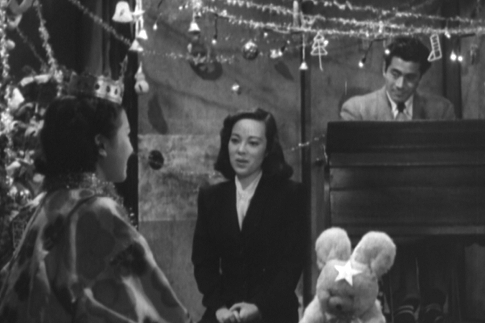
Last year I wrote Christmas probably wasn’t referred to in Japanese movies earlier than in the eighties. Imagine my surprise discovering the holiday plays a big part, a crucial part in Kurosawa Akira’s 1950 movie Scandal. A movie much loved by me because I saw it for the first time when I was scandalized by the Dutch media myself (for criticizing prominent islamophobes and racists), just as Mifune Toshiro and Yamaguchi Shirley in Scandal. I just never registered it as a Christmas movie.
But it’s undeniably so: the highpoint of the film is a Christmas party in a bar full of drunkards and whores, the rejects of society, where seedy lawyer Shimura Takashi atones for his misdeeds and then sings Christmas carols with his client Mifune Toshiro, a famous painter Shimura is supposed to represent in a court case against a tabloid paper. Mifune takes the paper to court because it has slandered him along with star singer Yamaguchi, by accusing them of having an illegitimate affair.
Shimura, however, took a bribe from the paper’s editors and is ridden with guilt, especially after Mifune and Yamaguchi organised a Christmas celebration for his terminally ill daughter, to whom Yamaguchi sings Holy Night while Mifune accompanies her on an organ. The scene in which Mifune brings happiness to not only Shimura’s home, but to the whole neighborhood by delivering a fully decorated Christmas tree on his noisy motor cycle is a delight, see the video clip underneath.
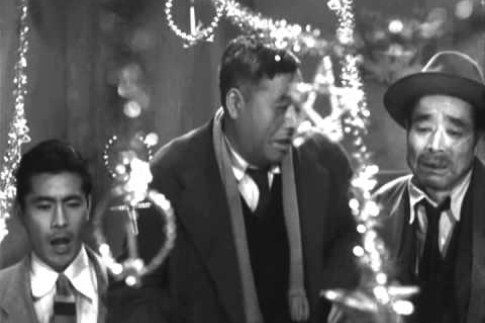
Scandal is considered one of Kurosawa’s lesser films by connoisseurs, but it’s one of my favorites, not only for personal reasons. Kurosawa was angry at the Americanised press in Japan when he made this film, which in his view abandoned all journalistic ethics in its hunger for scoops, and had no problems destroying people’s lives in the process. “They can only go so far because their victims are too cowardly to do anything about it”, Mifune says when people advice him against taking the tabloid to court.
I think Scandal is not only a criticism of the upcoming tabloid press in Japan, but of certain western influences in general, symbolised by Mifune’s noisy motor cycle and the Christmas decorations seen throughout the film. But there’s an ambiguity here, because the motor cycle also brings joy and Christmas serves as a catalyst for Shimura’s repentence.
A Christmas movie in the best western tradition, therefore, and much more layered than it usually gets credit for.
Christmas, Film Reviews, Japan, Peter Breedveld, 21.12.2020 @ 16:32






 RSS
RSS